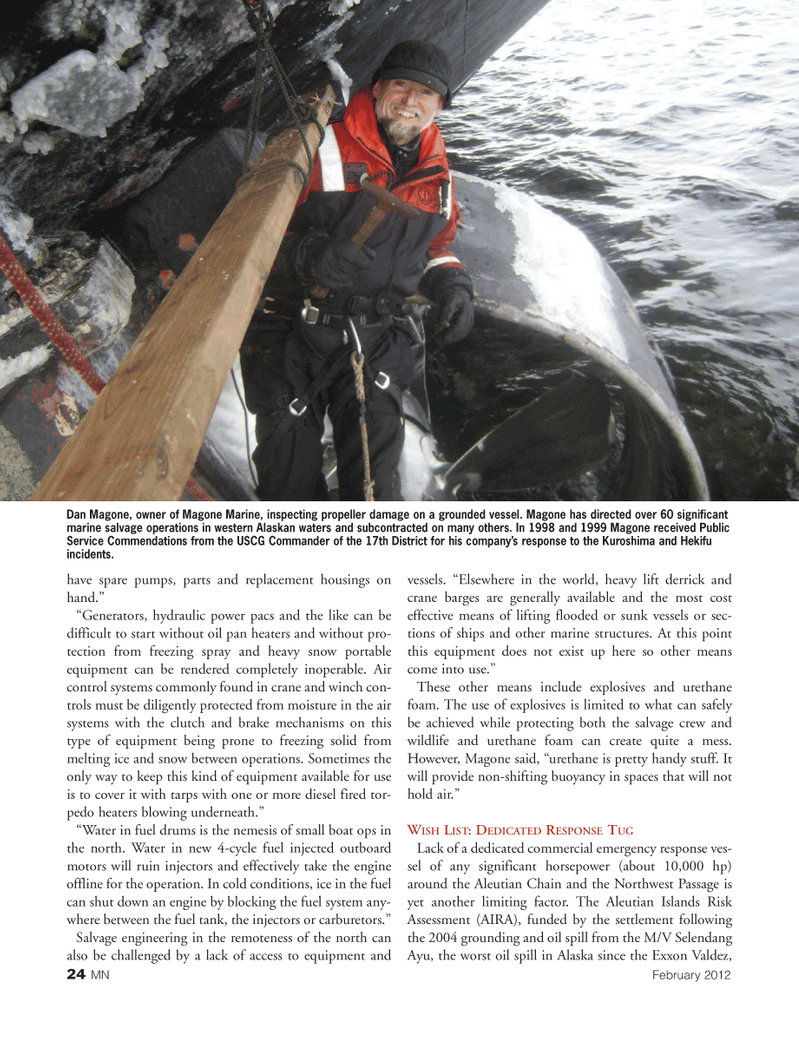
Page 24: of Marine News Magazine (February 2012)
Inland Bulk Transportation
Read this page in Pdf, Flash or Html5 edition of February 2012 Marine News Magazine
24MNFebruary 2012 have spare pumps, parts and replacement housings on hand.??Generators, hydraulic power pacs and the like can be difficult to start without oil pan heaters and without pro- tection from freezing spray and heavy snow portable equipment can be rendered completely inoperable. Air control systems commonly found in crane and winch con- trols must be diligently protected from moisture in the air systems with the clutch and brake mechanisms on thistype of equipment being prone to freezing solid from melting ice and snow between operations. Sometimes the only way to keep this kind of equipment available for use is to cover it with tarps with one or more diesel fired tor- pedo heaters blowing underneath.? ?Water in fuel drums is the nemesis of small boat ops in the north. Water in new 4-cycle fuel injected outboard motors will ruin injectors and effectively take the engine offline for the operation. In cold conditions, ice in the fuel can shut down an engine by blocking the fuel system any- where between the fuel tank, the injectors or carburetors.? Salvage engineering in the remoteness of the north can also be challenged by a lack of access to equipment and vessels. ?Elsewhere in the world, heavy lift derrick and crane barges are generally available and the most cost effective means of lifting flooded or sunk vessels or sec- tions of ships and other marine structures. At this point this equipment does not exist up here so other means come into use.?These other means include explosives and urethane foam. The use of explosives is limited to what can safely be achieved while protecting both the salvage crew and wildlife and urethane foam can create quite a mess. However, Magone said, ?urethane is pretty handy stuff. It will provide non-shifting buoyancy in spaces that will not hold air.? WISHLIST: DEDICATED RESPONSETUGLack of a dedicated commercial emergency response ves- sel of any significant horsepower (about 10,000 hp) around the Aleutian Chain and the Northwest Passage is yet another limiting factor. The Aleutian Islands Risk Assessment (AIRA), funded by the settlement following the 2004 grounding and oil spill from the M/V Selendang Ayu, the worst oil spill in Alaska since the Exxon Valdez, Dan Magone, owner of Magone Marine, inspecting propeller damage on a grounded vessel. Magone has directed over 60 significant marine salvage operations in western Alaskan waters and subcontracted on many others. In 1998 and 1999 Magone received Public Service Commendations from the USCG Commander of the 17th District for his company?s response to the Kuroshima and Hekifu incidents.MN#2 (18-31):MN 2011 Layouts 2/3/2012 1:42 PM Page 24

 23
23

 25
25
